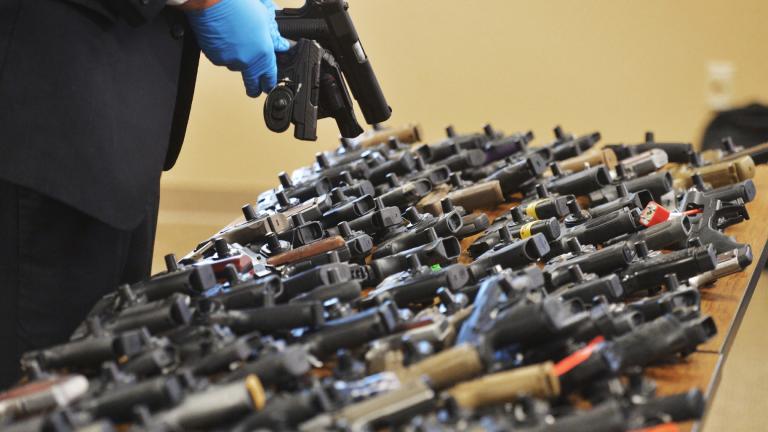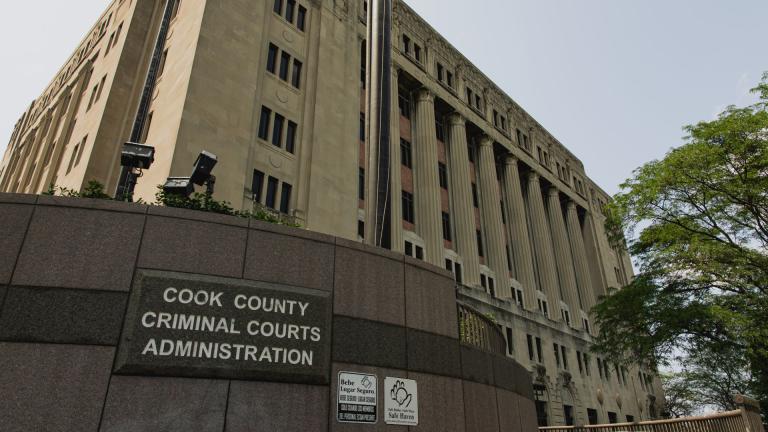 (WTTW News)
(WTTW News)
A woman who was sentenced to death and spent nearly three decades in prison is suing the city of Chicago and a former police detective who has been accused of routinely framing suspects, claiming he and others worked to wrongfully convict her following a double homicide.
Attorneys for Marilyn Mulero filed a federal lawsuit Monday against the city, disgraced former Chicago police Det. Reynaldo Guevara and others in a 13-count complaint alleging Mulero was the victim of a malicious prosecution and forced into falsely confessing to the murder of two men in 1992. Mulero spent 28 years in prison, five of which were spent on death row, before she was exonerated and released.
“The pain she went through was of a magnitude that cannot be described,” Mulero’s attorney, Antonio Romanucci, said during a press conference Tuesday.
In addition to the city and Guevara, the lawsuit also names the estate of Guevara’s former partner, ex-Det. Ernest Halvorsen, who died in 2020. A spokesperson for Chicago’s Law Department said the department had not yet officially been served with the lawsuit as of Tuesday afternoon and would have “no further comment as the matter is now in litigation.”
Mulero, then 21 years old, was accused of being involved in the May 1992 murders of reputed gang members Hector Reyes, 21, and Jimmy Cruz, 22, in Humboldt Park. Investigators believed Mulero and two others — 15-year-old Jacqueline Montanez and 16-year-old Madeline Mendoza — were members of a rival gang and had killed the men in retaliation for a separate gang murder days prior.
But according to Mulero’s attorneys, it was Montanez who fatally shot the men, and she did so without involvement from either Mulero or Mendoza. Montanez quickly bragged about the murders to another woman, according to the lawsuit, and when that woman was later arrested on drug charges, she informed police that Montanez had confessed to the killings.
Even so, the lawsuit claims Guevara and Halvorsen “took the opportunity to lock up other suspected gang members” and arrested both Mulero and Mendoza.
Before taking them back to the police station, the detectives allegedly drove the two around while attempting to question them. When they didn’t get any answers, the detectives drove them into rival gang territory and attempted to flag down gang members, telling them “these are the two who killed your homeboys,” according to the lawsuit.
The complaint claims neither Mulero or Mendoza were advised of their Miranda rights, and during questioning at the police station, the detectives informed Mulero she had two options: confess to one of the shootings or be convicted for both, which would lead to a death sentence.
“Mulero, who was only 21-years-old, was terrified that she would be killed by the Latin Kings, terrified that she would be subjected to lethal injection and never see her children again, and terrified that Guevara and Halvorsen were unrelenting and would continue with their abusive interrogation tactics,” her attorneys wrote in the lawsuit.
After several hours of overnight interrogation, Mulero falsely confessed that she had killed Cruz. Guevara and Halvorsen then allegedly fabricated additional evidence against Mulero — who was charged with first-degree murder and pleaded guilty in September 1993, believing it “was her only choice,” according to the lawsuit.
Despite her guilty plea, a jury found her eligible for the death penalty and she was sentenced to death. Montanez was convicted of the two murders and sentenced to life in prison — a sentence which has since been reduced — while Mendoza pleaded guilty and was sentenced to 35 years in prison.
Mendoza was released in 2009, and Cook County prosecutors ultimately vacated her conviction earlier this year.
Illinois outlawed the death penalty in 2011, but Mulero still spent 28 years in prison before Gov. J.B. Pritzker commuted her sentence in 2020.
“It’s been a long process,” Mulero said Tuesday. “Every day I wake up wondering what it’d be like to take my children to school.”
She said she wrote some 3,000 letters seeking support while she was incarcerated, but didn’t begin to get any responses until after her release. Mulero said she’s now living with one of her sons, but had struggled with finding a job and a home after her release.
“I struggle every day, because I'm a broken woman,” she said. “I’m trying to rebuild myself, but it’s hard, it’s difficult, it’s not easy. … This is something we have to live with for the rest of our lives.”
According to the lawsuit, Guevara and Halvorsen’s alleged misconduct included: failing to provide Mulero with access to a lawyer; using unconstitutional interrogation tactics; coercing a false confession through “intimidation and psychological torture;” and manipulating witnesses into providing false statements.
“Worse yet, Guevara and Halvorsen, together with their co-conspirators, engaged in this conduct knowing that Mulero was innocent,” her attorneys wrote in the lawsuit. “This evil and injustice cannot be overstated.”
Over the years, more and more misconduct allegations have been made against Guevara.
In 2017, a judge expressed his belief that Guevara had routinely lied under oath.
In September 2021, the Chicago City Council agreed to pay $20.5 million to two men who each spent 23 years in prison after being convicted of murder in 1993 based on evidence obtained by Guevara.
More than two dozen criminal exonerations in 2022 were tied to Guevara, according to an annual report from the National Registry of Exonerations.
Guevara’s name is also included on Cook County State’s Attorney Kim Foxx’s “Do Not Call” list, which includes a collection of “disreputable” law enforcement officers who won’t be used as witnesses in trials.
According to Mulero’s attorneys, Guevara continues to collect more than $80,000 per year from his police pension.
Heather Cherone contributed to this report.
Contact Matt Masterson: @ByMattMasterson | [email protected] | (773) 509-5431








